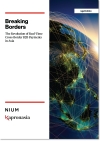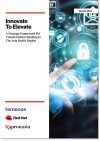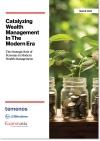Latest Insight
- Why cash is still prevalent in Asia
- Japan steps up green finance efforts
- South Korea charts middle path on crypto
- Should Grab and GoTo merge?
- Singapore pushes ahead with fintech-driven sustainability
- Digital banks in South Korea continue to thrive
- Billease is the rare profitable BNPL firm
- Fintech sector in Pakistan faces mounting challenges
- Where digital banks in Asia can make a difference
- Cashless payments jump in Vietnam
Latest Reports
-
Breaking Borders
 Despite progress in payment systems, the absence of a unified, cross-border Real-Time Payments (RTP) network means that intermediaries play a crucial role in facilitating connectivity. This report examines the ongoing complexities, challenges, and initiatives in creating a seamless payment landscape across Asia. Innovate to Elevate
Despite progress in payment systems, the absence of a unified, cross-border Real-Time Payments (RTP) network means that intermediaries play a crucial role in facilitating connectivity. This report examines the ongoing complexities, challenges, and initiatives in creating a seamless payment landscape across Asia. Innovate to Elevate In the dynamic and diverse financial landscape of the Asia-Pacific (APAC) region, banks are at a pivotal juncture, facing the twin imperatives of innovation and resilience to meet evolving consumer expectations and navigate digital disruption. Catalyzing Wealth Management In The Modern Era
In the dynamic and diverse financial landscape of the Asia-Pacific (APAC) region, banks are at a pivotal juncture, facing the twin imperatives of innovation and resilience to meet evolving consumer expectations and navigate digital disruption. Catalyzing Wealth Management In The Modern Era Hyper-personalized wealth management presents a paradigm shift from traditional models relying on static, generalized segments. Developing tailored investor personas based on psychographics, behaviours and fluid financial goals enables financial institutions to deliver rich and tailored customer experiences that resonate with next-generation priorities.
Hyper-personalized wealth management presents a paradigm shift from traditional models relying on static, generalized segments. Developing tailored investor personas based on psychographics, behaviours and fluid financial goals enables financial institutions to deliver rich and tailored customer experiences that resonate with next-generation priorities.
Events
| April 23, 2024 - April 25, 2024 Money 2020 Asia 2024 |
| October 21, 2024 - October 24, 2024 Sibos Beijing |
| November 06, 2024 - November 08, 2024 Singapore Fintech Festival |
The Financial Action Task Force (FATF ) told the Philippines in October to improve its anti-money laundering regime or else face the possibility of being placed on the organization's blacklist once again, an unenviable position. FATF gave Manila one year to get its house in order. The Philippines does not want to be on that blacklist: Banking sanctions could ensue that would make it harder for Filipino workers to remit money home, while foreign countries could increase due diligence checks on Philippine companies. Philippine banks might also charge higher interest rates as their own costs rise due to the tougher business environment.
“We cannot afford to have the Philippines in the FATF’s list of high risk and non-cooperative jurisdictions. Hence, we should be very strategic in our focus for the next 12 months,” Bangko Sentral ng Pilipinas Governor Benjamin Diokno said last October.
The competition for Singapore digital banking licenses is heating up as yet another fintech throws its hat into the ring. This time, the contender is homegrown fintech MatchMove which is applying for a digital full-bank (DFB) license together with Singapura Finance, the Thai blockchain startup LightNet and the London fintech startup OpenPayd. There are only two DFB licenses up for grabs. They allow licensees to conduct both retail and corporate banking. Digital wholesale bank (DWB) licenses are valid only for non-retail banking.
WeChat Pay has for several years been trying to develop its business outside of China. The first step is usually to partner with local merchants, making WeChat Pay available at points of sale where Chinese tourists shop. The second step is to target the local market. Thus far, WeChat has been more successful capturing Chinese tourists' wallet share overseas than in becoming a trusted local digital banking provider.
The novel coronavirus outbreak could slow WeChat Pay's global expansion considerably in the short term. Put simply, what happens if your international payments business primarily depends on Chinese tourists and suddenly there are none?
The United States is currently focused on fighting the coronavirus outbreak, which has surged in the country since early March. Containment efforts are occupying much of the government's time, and with good reason. The massive health and economic threat posed by the virus means that Washington has little time for less pressing matters. Yet underlying tensions between the U.S. and China remain, with the financial sector the next front of an emerging cold war.
In early March, U.S. lawmakers sought to curb the access of Chinese telecoms giant Huawei to American banks. The White House had mulled doing so in December but decided against it amidst a flurry of activity to reach a phase-one trade deal with China. The NETWORKS Act introduced earlier this month would effectively ban 5G producers such as Huawei from accessing the U.S. financial system if they are found to be violating sanctions or engaging in industrial or economic espionage.
Gaming company Razer isn't the most obvious shoo-in for one of Singapore's digital banking licenses, but has unique advantages it brings to the table. Those include a user base 80 million strong primarily composed of millennials, one of the key target demographics of neobanks. Razer established a fintech unit in 2018 to respond to the need for in-game payment. If it gets the license, Razer wants to expand its digital banking services beyond East Asia to the Middle East, Europe and North America.
The leading enabler of digital commerce across the Middle East and Africa region, Network International, made an agreement with Tencent Holdings Limited in February 2020 that will enable millions of Chinese tourists to transact through Network International’s extensive UAE merchant network with their WeChat mobile wallets.
The largest merchant acquirer in the United Arab Emirates, Network will perform as a settlement partner or acquirer as well as solution provider in order to enable mobile-based transactions via WeChat Pay at points of sale as well as for online purchases.
Well before COVID-19 broke out, Hong Kong's future as a global financial center was in question. The protests that broke out last year have raised concerns about the city's ability to maintain its unique competitive strengths. Further erosion of political stability and the rule of law will augur ill prospects for the former British colony. In the short run, it is true that none of Hong Kong's neighbors can challenge its position as the region's preeminent financial center. But Hong Kong cannot assume that will never change.
Peer-to-peer lending is one of the fintech segments that most struggles to gain credibility. Next to cryptocurrency, it may be the most susceptible to scams. But it is not only borrowers who are at risk. Lenders can easily get burned when borrowers default. Since many borrowers on P2P lending platforms are those unable to get a loan elsewhere, their credit is typically not optimal.
P2P lending began growing quickly in South Korea about four years ago, offering attractive returns to investors amidst very low interest rates. Some P2P businesses began venturing into risky investments such as real estate project funds, non-performing loans and mortgages. South Korea had 239 P2P lenders in December 2019, up from just 27 four years earlier. Their outstanding loan balance totaled 2.38 trillion won.
North Korea's growing nuclear program has long been a point of contention between the U.S. and China. Beijing prefers to handle its mercurial neighbor with kid gloves while Washington favors a tougher approach, namely economic sanctions. To evade sanctions in the digital age, Pyongyang has upped its hacking game. Both banks and cryptocurrency exchanges are victims. Digital currency offers North Korea a way to raise funds and do business outside the US dollar led global financial system. North Korea stole more than US$2 billion from both traditional financial institutions and crypto exchanges - including South Korea's Bitthumb - the United Nations said in an Aug. 2019 report.
The novel coronavirus outbreak has crimped business activity across China, bringing the world's second largest economy to a virtual standstill. Yet amidst those unprecedented conditions, China's fintech giants have been busy developing digital solutions to mitigate COVID-19's impact. Some of the solutions are aimed squarely at the consumer economy, while others support government efforts to track people's health status.
More...
Cambodian and Thai regulators recently announced the launch of an interoperable payment QR code for use between Cambodia and Thailand. Cambodian tourists who visit Thailand may now use their mobile banking app to pay in Cambodian riel when shopping at stores that display a Thai QR Payment sign, while the same functionality will be extended to Thai tourists in Cambodia by Q3 this year.
A collaboration between the Siam Commercial Bank (SCB) and five Cambodian commercial banks, the interoperable QR code was developed upon domestic electronic transfer system PromptPay which runs on Vocalink infrastructure. ACLEDA Bank PCL, Cambodia Commercial Bank (CCB) and the Foreign Trade Bank of Cambodia (FTB) are sponsoring banks of the collaboration, which mean that other banks would be required to work with the three in order to provide the service.
Ant Financial's international expansion runs on two separate tracks. The first is a concerted push into emerging markets, especially in South Asia. In these countries, Ant is laying the groundwork to become a primary provider of digital financial services to the local market. In many cases, incumbents and digital infrastructure are both weak. Ant sees opportunities to leverage both its banking and technology acumen in countries such as Bangladesh, Pakistan and Nepal.
It's a very different story in Western Europe. There, Ant is making gradual inroads. The Chinese fintech giant says it wants to serve the local market, but its products are designed for Chinese consumers and businesses. European incumbents, meanwhile, are often entrenched. There's no easy way around that. Growing in Western Europe through acquisitions in local companies makes more sense than going it alone. With that in mind, Ant recently took a minority stake in Swedish payments platform Klarna, the most valuable fintech startup in Europe alongside the UK's Revolut. Klarna is currently valued at US$5.5 billion and says that it has 80 million customers globally.
Singaporean ride-hailing giant Grab is set upon becoming a top digital bank in Asia. Over the past year, the company has raised billions from investors in a bid to fund the transformation from app-based neo-taxi service into neobank. It has inked numerous deals with financial services incumbents and applied for one of Singapore's coveted digital full banking (DFB) licenses. If Grab's application is successful, it will be allowed to conduct both retail banking and corporate lending in Southeast Asia's financial center.
While Grab has troves of user data and digital acumen, it lacks financial industry expertise. Addressing this shortfall is crucial for the company to gain the trust of customers as a financial services provider. The segue from ride hailing to banking is not as seamless as Grab sometimes suggests. Partnering with a large commercial bank could help Grab bridge that gap, and increase its chances of securing the DFB. Japan's Mitsubishi UJF Financial Group (MUFG), which led Grab's recent US$856 million funding round, is just that type of partner.
The novel coronavirus outbreak is crimping global business as people avoid travel and even going out in public. The sharp contraction in business activity augurs ill prospects for the financial industry. Banks are not optimistic about their first quarter results. If the virus isn't contained soon, the second quarter could be even worse.
For the nascent virtual banking segment, Covid-19 is a double-edged sword. On the one hand, e-commerce demand remains strong thus far. Consumers still need to buy essential everyday items. If they are hesitant about visiting a physical store, the best option is to make the purchases online. In the short term, that means a rise in online transactions and in many cases the use of digital wallets.
Malaysia is set to introduce digital banking following the passage of a new regulatory framework by its central bank in December. The central bank said it would issue up to five licenses to qualified applicants to set up digital banks. The licenses will allow the holders to conduct either conventional or Islamic banking business in Malaysia. Capital requirements are not low, with an absolute minimum of RM 100 million (US$23.7 million) necessary during a three to five year foundational phase and thereafter RM 300 million.















